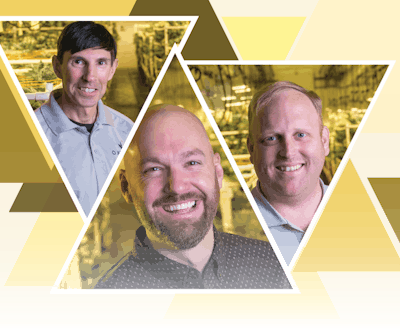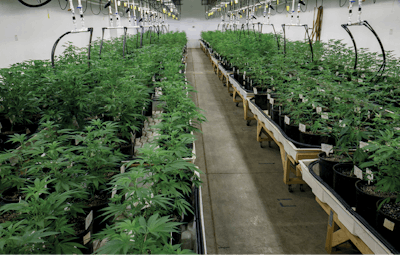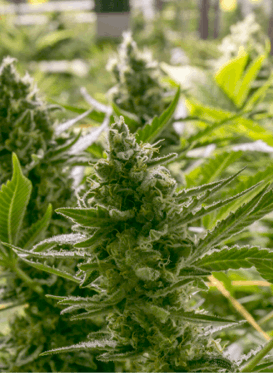
Phoenix-based Adakai Holdings has an interesting business model. The company was founded in 2010 by Dustin Johnson—after he witnessed his mother struggle with medical issues without access to medicinal cannabis—and is comprised of four brands: Monarch, a medical dispensary in Scottsdale; ProKure1, an odor pathogen-control system for growers; Omaha Farms, an indoor cultivation facility with its own line of craft cannabis products; and Huxton, an additional line of branded product. All these different entities work together, aiming to elevate the medical marijuana market in Arizona, and Johnson has high hopes of selling across state lines in the near future.
Johnson, along with the team’s Lead Grow Tech Mark Riddenour and Botanist/Production Manager Matt Lascala spoke with Cannabis Business Times Managing Editor Cassie Neiden to provide insights behind their discrete packaging, their “house of brands” marketing strategy, cinematography experimentation, and more.
Cassie Neiden: What is your cultivation process like?
Mark Riddenour: Our building is great because it’s a high-tech, newer building, but we do old-school farming approaches … with the soil having this symbiotic relationship with the organic fertilizers in with the plant, and then combining new-school irrigation approaches—we don’t have to do it by hand.
Matt Lascala: [The old-school/new-school approach is about] not relying on an app or computer screen to tell you what’s going on in the farming, but being involved … looking at every single plant through [its] stages. We operate about 10,000 plants, so that’s a lot of scouting, and a lot of emphasis on plant health, [which] is part of the nuts and bolts of our job. … [With cultivation, there are] a lot of practices still to be discovered—the book still hasn’t been written to what we’re doing; we’re just … playing to that old-school approach with some of the newer techniques, … never getting complacent, … always tweaking the recipe, always riding on the edge of testing and sourcing genetics, and really making sure we get the best possible product to the market consistently.

Neiden: Can you tell me about your Huxton brand?
Dustin Johnson: It’s really designed to be a lifestyle brand. The No. 1 question we notice at the shop is always, “How is this going to make me feel?” And really, the only good information we could give them was, “It’s a sativa” or “It’s an indica” or “It’s a hybrid.”
We took about a year and tried to understand how our genetics performed, how they made people feel, and then we classified them into three series: Rise, Hi-Fi and Zen, and those are all designed to give people an understanding of the experience that they can expect from those products.
We launched [the Huxton] brand about a year ago, and it’s sold in, I believe, 18 shops here in the state. … We wanted to design it in a way that was welcoming to the consumer, but also discrete so that it didn’t have a lot cannabis or marijuana connotations on the packaging … so that people would feel comfortable setting a tin or a bag of it on their coffee table.
Neiden: Why have you decided to market Omaha Farms on its own?
Johnson: Omaha Farms [is] designed to be a growers’-direct, more of a craft cannabis feel. It’s done with a theme of ‘Smoke Local,’ so we’re trying to educate the consumer here in Arizona. … We want to let them know a little bit more about our process, the techniques that we’re doing, and the ways that we’re differentiating our product from other folks out there, so that’s really our second line [of products].
Neiden: Why do you think it’s important to have different brands instead of having your different products fall under one name, like Omaha Farms or Huxton?
Johnson: We kind of had a lot of debate about that, too. I think that we chose to go with a house of brands methodology versus a branded house, so to speak. … We felt that there was more opportunity to silo each brand in the unique characteristics and themes that we were building around it, and then give it fuel to merge into the space. … So, the theory is to start these brands, incubate them here in Arizona and start to give them some fuel for growth, and then eventually start taking them into other markets.
Neiden: I noticed some of the same product is displayed in different types of packaging. What was the thought process behind this?
Johnson: Our goal with Huxton was to create more of the mainstream feel and vibe with those products, but also create some more ease of use for the consumer. So we have our traditional, single-strain products that come in our standard Mylar bag for folks that are just looking for what they’ve been used to seeing—those bigger buds that they can break up and consume in whatever fashion they would like.
But then we also do a [circular] tin … [with] more of our smaller buds, or our middle canopy product, … that is designed to be “bowl ready.” … We wanted to put it in a container that was easy to carry with you … for … more adventurous cannabis consumers looking to go for hikes or go do things where they need to be able to carry that product with them.
Then [with our] pre-roll tins, you’re going to get seven pre-rolls … along with a book of matches. And again, that tin was designed to be sleek and something to be able to throw in a … pocket. We liked the idea of providing the ability to light those pre-rolls with the package because talking with a lot of consumers—myself included—you’re always fumbling for a lighter or looking for matches.
Neiden: I watched a marketing video on your website for the Huxton brand, which had no direct reference—verbal or visual—to cannabis. Why take this route?
Johnson: We worked with a group here—Kitchen Sink Studios—that assisted us with the cinematography. … We wanted to create a film that evokes the experience and feeling of the message that we were trying to get across … without having to do what’s traditionally done, which is show products [and] show people consuming. We wanted to be a little bit more allusive, a little bit more discrete [and] try to find some unique ways to get the message across about the experience of cannabis and the way that it can make you feel, the type of experiences it can elevate or heighten. … We also wanted the opportunity to be able to run that film maybe on some more traditional media platforms that might not be able or … willing to show the product being consumed or product [itself].

Neiden: From the cultivation side, what’s your biggest challenge?
Riddenour: We really focus on that high-quality product. It’s just the challenge of bringing that consistency to all of our products, day in and day out, with that attention to detail. ... If we see something that does not meet that standard then we will not put it out to market. … Just realizing our ethics and our standards are at the top is really what I’ve enjoyed about this company. …
LASCALA: We’re always trying to serve multiple masters, and the regulation is constantly evolving. ... As an industry, we’re growing together … so collaboration is going to become monumentally important. And as the industry gets a little more open and traditionalized, … that will become more pervasive, I would think, and the grow tech would become a little more ubiquitous. Then the focus would become patient protection and testing … and regulation and, like Mark said, consistency.
Neiden: Mark, as a grower with experience in Colorado, what are some of the lessons you learned there before moving to Arizona?
Riddenour: I would say [having] a “business mind” and “regulation mind,” along with the cultivating, and [realizing] that it’s not just about the plants; [being aware that] there’s a lot more that goes into it is probably the crux of what I learned in my five years or more in Colorado. When I got started, it was the Wild, Wild West in Colorado, and a lot of people weren’t really good actors, so it was interesting to learn all the regulations and the rules, and then come down here where the company was hyper-focused on regulation and longevity, and having that long-term pride, if you will, for their business, and not just some kind of a fly-by-night operation, which I had seen a lot of in Colorado.
Neiden: What's the best business decision you’ve ever made with Adakai?
Johnson: [Medical legalization] passed in 2010 in Arizona, and it took a few years for it to get implemented—there were some legal challenges surrounding it—so we were tracking it ... during that course of time, … engaging in the industry. And [also], really understanding the power of brand and the need that this industry has to create brand-new concepts.
I could say that the best decision we made was to jump off the high dive and do a cannonball into this industry to start with. … I would encourage anybody that’s ... kicking it around to take the leap.
Neiden: And the worst?
Johnson: We launched Huxton in 2016, in the beginning of the year, and considering the great response we’ve gotten from patients, from consumers, ... I just wish we would have thought of it sooner and had a few more years of momentum behind us. But I think that we’re still young as a company, and we’ve still got our future ahead of us, so we can make up for that time.















